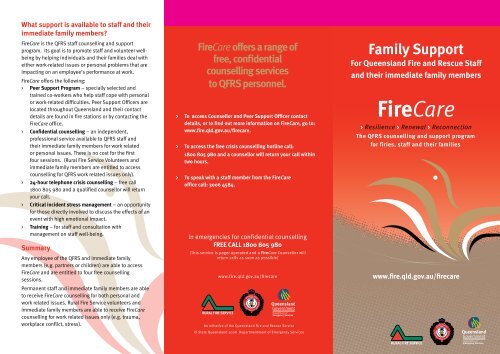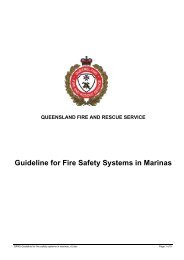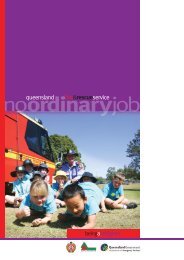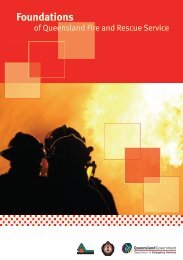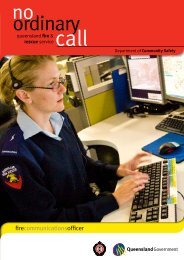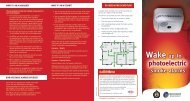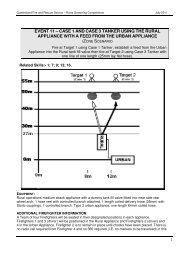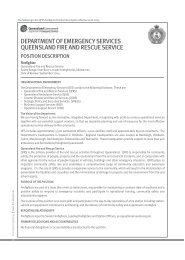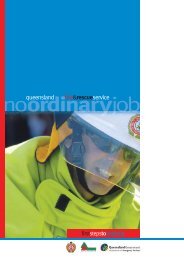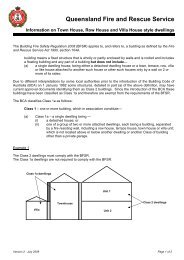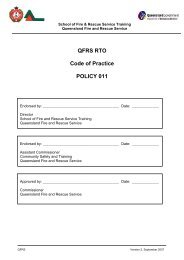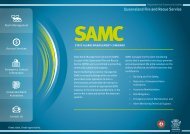Firecare: Family Support - Queensland Fire and Rescue Service
Firecare: Family Support - Queensland Fire and Rescue Service
Firecare: Family Support - Queensland Fire and Rescue Service
- No tags were found...
Create successful ePaper yourself
Turn your PDF publications into a flip-book with our unique Google optimized e-Paper software.
What support is available to staff <strong>and</strong> theirimmediate family members?<strong>Fire</strong>Care is the QFRS staff counselling <strong>and</strong> supportprogram. Its goal is to promote staff <strong>and</strong> volunteer wellbeingby helping individuals <strong>and</strong> their families deal witheither work-related issues or personal problems that areimpacting on an employee’s performance at work.<strong>Fire</strong>Care offers the following:> Peer <strong>Support</strong> Program – specially selected <strong>and</strong>trained co-workers who help staff cope with personalor work-related difficulties. Peer <strong>Support</strong> Officers arelocated throughout <strong>Queensl<strong>and</strong></strong> <strong>and</strong> their contactdetails are found in fire stations or by contacting the<strong>Fire</strong>Care office.> Confidential counselling – an independent,professional service available to QFRS staff <strong>and</strong>their immediate family members for work relatedor personal issues. There is no cost for the firstfour sessions. (Rural <strong>Fire</strong> <strong>Service</strong> Volunteers <strong>and</strong>immediate family members are entitled to accesscounselling for QFRS work related issues only).> 24-hour telephone crisis counselling – free call1800 805 980 <strong>and</strong> a qualified counsellor will returnyour call.> Critical incident stress management – an opportunityfor those directly involved to discuss the effects of anevent with high emotional impact.> Training – for staff <strong>and</strong> consultation withmanagement on staff well-being.SummaryAny employee of the QFRS <strong>and</strong> immediate familymembers (e.g. partners or children) are able to access<strong>Fire</strong>Care <strong>and</strong> are entitled to four free counsellingsessions.Permanent staff <strong>and</strong> immediate family members are ableto receive <strong>Fire</strong>Care counselling for both personal <strong>and</strong>work related issues. Rural <strong>Fire</strong> <strong>Service</strong> volunteers <strong>and</strong>immediate family members are able to receive <strong>Fire</strong>Carecounselling for work related issues only (e.g. trauma,workplace conflict, stress).<strong>Fire</strong>Care offers a range offree, confidentialcounselling servicesto QFRS personnel.> To access Counsellor <strong>and</strong> Peer <strong>Support</strong> Officer contactdetails, or to find out more information on <strong>Fire</strong>Care, go to:www.fire.qld.gov.au/firecare.> To access the free crisis counselling hotline call:1800 805 980 <strong>and</strong> a counsellor will return your call withintwo hours.> To speak with a staff member from the <strong>Fire</strong>Careoffice call: 3006 4584.In emergencies for confidential counsellingFREE CALL 1800 805 980(This service is pager operated <strong>and</strong> a <strong>Fire</strong>Care Counsellor willreturn calls as soon as possible)www.fire.qld.gov.au/firecareAn Initiative of the <strong>Queensl<strong>and</strong></strong> <strong>Fire</strong> <strong>and</strong> <strong>Rescue</strong> <strong>Service</strong>© State <strong>Queensl<strong>and</strong></strong> 2008 Departmentment of Emergency <strong>Service</strong>s<strong>Family</strong> <strong>Support</strong>For <strong>Queensl<strong>and</strong></strong> <strong>Fire</strong> <strong>and</strong> <strong>Rescue</strong> Staff<strong>and</strong> their immediate family members<strong>Fire</strong>Care> Resilience > Renewal > ReconnectionThe QFRS counselling <strong>and</strong> support programfor firies, staff <strong>and</strong> their familieswww.fire.qld.gov.au/firecare
Do you have a partner/family member who isemployed by the QFRS?If you have a partner or family member who is an employeeor volunteer of the <strong>Queensl<strong>and</strong></strong> <strong>Fire</strong> <strong>and</strong> <strong>Rescue</strong> <strong>Service</strong>(QFRS) you may be interested in how the nature of their workcan affect them. You may also be interested in how you canbe supportive <strong>and</strong> what type of support the QFRS offersemployees <strong>and</strong> volunteers in order to carry out their work.The purpose of this brochure is to provide generalinformation for family members <strong>and</strong> to explain how toaccess support.Working in Emergency <strong>Service</strong>sGiven the nature of work within the QFRS, employees can beexposed to incidents that are professionally <strong>and</strong> personallydem<strong>and</strong>ing.QFRS staff may be exposed to incidents that involve:> multiple fatalities> the deaths of children or persons known to a fire crew> the death of a firefighter> excessive media interest.Involvement in these types of incidents, commonly referredto as ‘critical incidents’ or ‘traumatic events’, can be highlystressful.QFRS staff may also be involved in deployments whichcan result in unanticipated <strong>and</strong> lengthy periods awayfrom home. During deployments, staff may also witnesstraumatic events.Common reactions of Emergency <strong>Service</strong>sworkersGiven the nature of their work, QFRS staff may experience arange of physical, psychological, emotional <strong>and</strong> behavioralreactions.These reactions are normal reactions to abnormally stressfulsituations <strong>and</strong> are not signs of weakness.Physical reactions may include:> sleeplessness> fatigue> being startled by noise> feeling tense or agitated> shaking, sweating or breathlessness> nausea or diarrhea.Psychological reactions may include:> frequent thoughts or images of the event> sudden, usually vivid, images of a past experienceappearing in one’s head (flashbacks) often induced bysmells, sounds or images> nightmares> confusion or difficulty making decisions> concentration <strong>and</strong> memory difficulties.Emotional reactions may include:> feelings of shock <strong>and</strong> disbelief> fear for the safety of oneself <strong>and</strong> others> anger about who caused the incident> sadness or depression> shame for either showing emotion or ‘getting off lightly’.Behavioural reactions may include:> withdrawing from other people> being easily irritated> losing interest in normal activities> reluctance to go to work> increasing alcohol or drug usage.Reactions such as these:> are usually many <strong>and</strong> varied.> may appear immediately or after a few weeks.> usually disappear after a short period of time.Post Traumatic Stress Disorder (PTSD)The majority of people experiencing reactions to traumaticevents recover with support from families, friends <strong>and</strong> coworkers.In a small percentage of situations, PTSD can develop<strong>and</strong> an individual will need professional help before they canfunction normally.How can family members be affected?While a QFRS staff member is experiencing the normalreactions associated with a critical incident this may impact onfamily life.The impact may include:> a disruption to family routine> other family members feeling uncomfortable with theintensity of the reactions> family members having difficulty underst<strong>and</strong>ing thereactions as it may not be clear how the reactions areconnected to the experiences especially if they occursome time after the event> communication becoming difficult because familymembers may not know what to say to each other ordo not feel like talking> family members not enjoying being together as muchas usual.Children <strong>and</strong> young people are sensitive to changeswithin family members though they may not have theability or willingness to discuss their own reactionswith family members. Children may express their fear orinsecurity by exhibiting unusual or difficult behaviours,for example, changes in eating <strong>and</strong> sleeping or revertingto behaviour that they have ‘grown out of’.How can you help your partner or familymember?> Listen to <strong>and</strong> acknowledge your family member’sexperiences.> Try to keep communicating with each other.> Encourage your family member to return to his or herusual social <strong>and</strong> work routines.> Make time for <strong>and</strong> plan recreational activities.> Keep an eye on everyone in the family.When to seek professional help?It is important to seek professional help if:> you feel that your family member’s needs are greaterthan your ability to provide support> you are unsure about your family member’s wellbeing> you are unsure about how to h<strong>and</strong>le your familymember’s reaction to an incident> you feel that your family member is displaying PostTraumatic symptoms.


